
In South Africa, having a car written off can be a challenging experience, often leaving vehicle owners uncertain about the process and its implications. Whether it’s due to severe damage from an accident, theft, or financial issues, understanding how to manage the legal, insurance, and financial aspects of a car write-off is essential. This comprehensive guide provides insight into what it means to write off a car in South Africa, the steps involved, and the options available to you. Are you ready to handle a car write-off and make informed decisions about your vehicle?
Key Takeaways
- Car Write-Off: In South Africa, a car is written off when the repair costs exceed its market value or when it’s deemed unsafe to repair. This decision is made by the insurance company after assessing the damage.
- Common Reasons and Process: Cars can be written off due to severe accidents, theft, fire, flood, or major mechanical failures. The process includes a damage assessment, insurance evaluation, and compensation based on the car’s pre-incident market value.
- Legal and Financial Impact: Writing off a car requires deregistration and affects insurance premiums and loan repayments. Gap insurance can cover the difference between the insurance payout and any outstanding loan balance.
About Arcadia Finance
Arcadia Finance makes securing your loan effortless. Choose from 19 reputable lenders with no application fees, all fully compliant with South Africa’s National Credit Regulator standards. Enjoy a streamlined process and options tailored to your financial needs.
What Does It Mean When Your Car Is Written Off?
Having your car written off can be a confusing and stressful situation. Essentially, a car is declared a write-off when the cost of repairing the damage exceeds a certain percentage of its market value, or when it is so severely damaged that it is considered unsafe to repair and return to the road. This determination is typically made by your insurance company after a thorough assessment. When a car is written off, it means that the insurer deems it beyond economical repair, and instead of fixing it, they will pay you the car’s market value before the incident.
Common Reasons for Writing Off a Car
There are several common scenarios in which a car might be written off in South Africa:
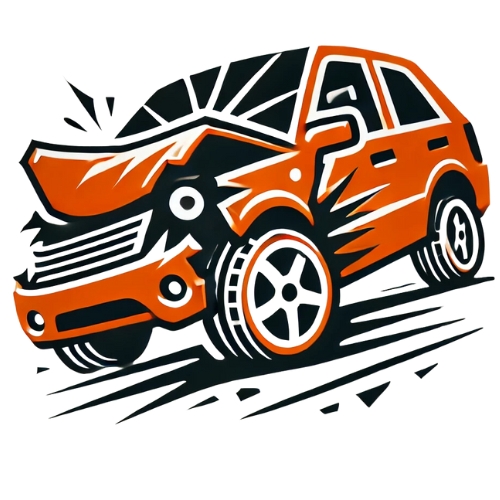
Severe Accident Damage
One of the most frequent reasons for a write-off is extensive damage from a car accident. If the repair costs are too high relative to the car’s market value, the insurance company may decide that it is more economical to declare the car a total loss.
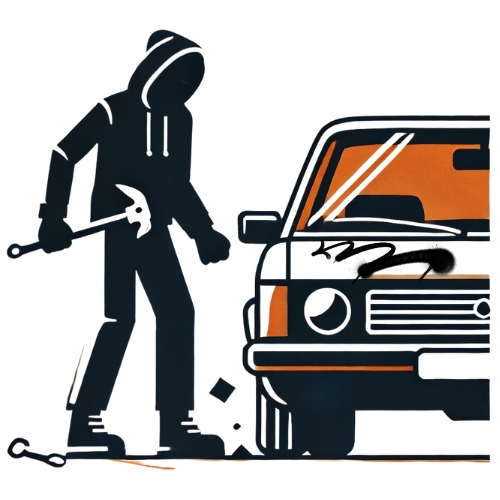
Theft and Vandalism
If a stolen car is recovered with significant damage or stripped of valuable parts, the cost of restoring it can be prohibitive, leading to a write-off decision. Similarly, extensive vandalism that compromises the car’s integrity can result in a write-off.
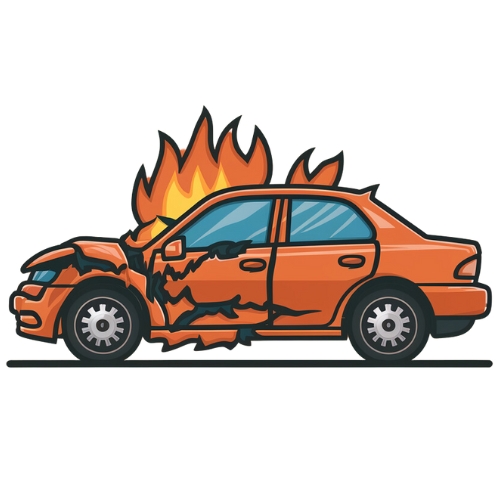
Fire Damage
Fires can cause severe damage to the structure and systems of a car, making it unsafe or uneconomical to repair. Cars that suffer from extensive fire damage are often written off.

Flood Damage
Cars exposed to flooding can suffer from severe water damage, including electrical system failures and structural corrosion. Given the potential for hidden and long-term issues, insurers often write off flood-damaged vehicles.

Mechanical Failures
In some cases, catastrophic mechanical failures, such as a seized engine or major transmission issues, can lead to a write-off if the cost of repairs exceeds the vehicle’s value.

Old Age and Wear
Older cars involved in minor accidents or suffering from significant wear and tear might be written off due to the high cost of parts and repairs relative to their depreciated market value.
Each of these situations requires careful assessment by insurance adjusters and often involves a thorough inspection to determine the feasibility and safety of repairs. Understanding these common reasons can help car owners better manage the process and make informed decisions when dealing with potential write-offs.
Even a write-off can be roadworthy again with the right funding. Discover how Car Repair Loans can get you back behind the wheel of a salvaged vehicle without draining your savings.
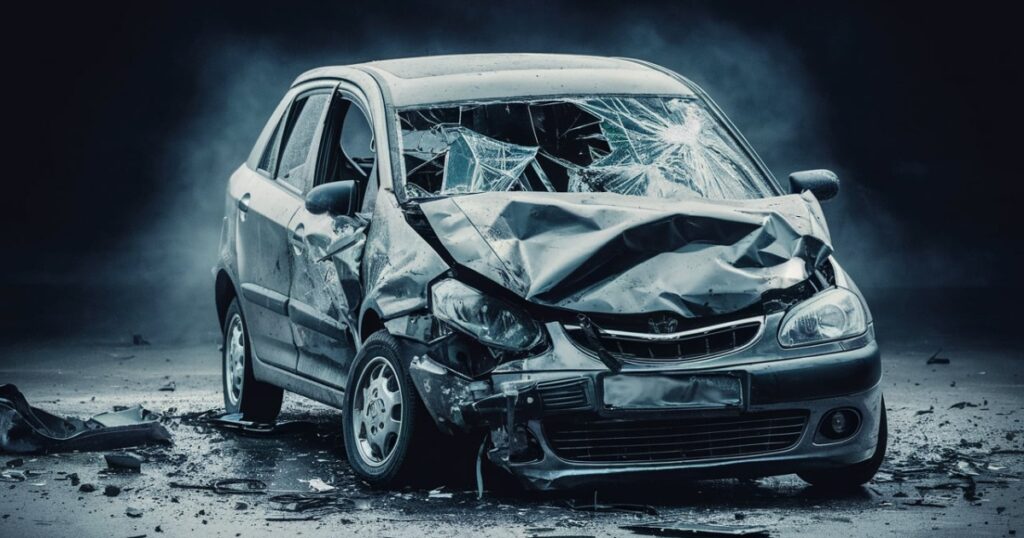
What is the Car Write-Off Procedure?
After a car accident, your insurance company will assess the extent of the damage to your vehicle. If the insurer determines that the cost of repairs is not economical, the vehicle will be classified as a write-off. This typically occurs when repair expenses are significant compared to, or exceed, the car’s insured value.
Typical Process for a Car Write-Off
- Damage Assessment: Post-accident, the car undergoes a damage assessment.
- Repair Cost Estimation: The repair costs are estimated and weighed against the vehicle’s current market value.
- Total Loss Declaration: If repair costs surpass the car’s market value, the insurer will likely declare it a total loss.
- Compensation: The insurer compensates the policyholder with the car’s market value minus any deductibles or policy limits.
- Title Transfer: The policyholder transfers the car’s title to the insurance company, which then sells the car for scrap.
The decision to declare a car a total loss hinges on the repair cost threshold relative to the car’s value. Additionally, some insurers have specific internal criteria to determine if a vehicle is a total loss.
Steps to Take After a Car Accident or Collision
- Record the Accident Details: Immediately note the date, time, and precise location where the accident occurred.
- Document Vehicle Information: Jot down the make, model, and licence plate numbers of all vehicles involved in the crash.
- Collect Driver Information: Obtain the names, ID numbers, and insurance details of all the drivers involved in the accident.
- Gather Witness Contact Information: It’s beneficial to get the contact information of any witnesses present at the scene, as their accounts might be useful later if there are disputes.
- Contact Your Insurance for Towing Authorisation: Reach out to your insurance provider to get approval for an authorised towing service to move your vehicle. Be cautious of tow truck operators who arrive at the scene and claim they are authorised; confirm with your insurance company to avoid being held responsible for towing and storage costs if they are not.
Once your car is written off, navigating the financial landscape to secure a new vehicle can be daunting. Learn the best way to finance a car and explore various options that suit your budget and lifestyle.

The Legal Process of Writing Off a Car
Steps to Officially Write Off a Car
- Initial Assessment
After an incident, the first step is to report the damage to your insurance company. They will arrange for an assessment of the vehicle’s condition. This assessment will determine the extent of the damage and the cost of repairs.
- Insurance Evaluation
The insurance company evaluates the repair costs against the car’s market value. If the cost of repairs is higher than the car’s value, the insurance company will declare the car a total loss or write-off.
- Notification
The insurance company will inform you of their decision to write off the car. You will receive a formal notification, which usually includes details of the payout amount based on the car’s market value before the damage occurred.
- Settlement Agreement
You will need to agree to the settlement offered by the insurance company. This often involves signing a settlement agreement, after which the insurance company will pay out the agreed amount.
- Vehicle Deregistration
In South Africa, a written-off car must be deregistered. This involves completing a “Notification of Change of Ownership/Sale of Motor Vehicle” (NCO) form and submitting it to the local registration authority. The car will be officially marked as a “write-off” in the vehicle registry.
- Disposal of the Car
The insurance company typically handles the disposal of the written-off car. It may be sold for scrap, parts, or at an auction. If you choose to keep the car, it must be marked as “Code 4” and cannot be driven on public roads.
Legal Implications and Requirements
Deregistration: Legally, a written-off car must be deregistered. This process involves notifying the relevant authorities and ensuring the car’s status is updated in the national vehicle registry. Failing to deregister a written-off vehicle can result in legal penalties.
Written-off vehicles are classified based on the extent of the damage:
- Code 2: Pre-owned vehicles that can be repaired and returned to the road.
- Code 4: Vehicles that are beyond repair and must be scrapped. These vehicles cannot be legally driven on public roads again.
Insurance Implications: Writing off a car has significant insurance implications. Once a car is written off, the insurance policy on that vehicle is typically terminated. The owner may receive a payout, but the car cannot be insured again in its current state.
Safety and Compliance: If a written-off car is repaired (in the case of a Code 2 vehicle), it must undergo rigorous safety inspections and comply with all legal standards before it can be reregistered and driven on public roads.
Disclosure Requirements: If you sell a repaired write-off, you are legally required to disclose its history to potential buyers. Failure to do so can lead to legal consequences and liability for any issues arising from the car’s previous damage.
Environmental Regulations: The disposal of written-off cars must comply with environmental regulations. This includes proper handling of hazardous materials and ensuring that the vehicle is disposed of in an environmentally friendly manner.
Considering different financing options? Vehicle finance with a balloon payment might just be the flexible solution you need to manage your budget effectively.
Impact on Car Loan and Financing
Outstanding Loan Balance
When a car is written off, the outstanding balance on the car loan does not disappear. Car owners are still responsible for repaying the remaining loan amount. This can be particularly challenging if the insurance payout does not cover the entire loan balance.
Insurance Payout
Typically, the insurance company will assess the market value of the car at the time of the accident and provide a payout based on this valuation. In many cases, this amount might be less than the outstanding loan balance, leaving the owner to cover the shortfall.
Gap Insurance
Gap insurance, or shortfall cover, can be beneficial in such situations. It covers the difference between the insurance payout and the outstanding loan balance, ensuring that the car owner is not left with a significant financial burden. It’s worth considering gap insurance when taking out a car loan in South Africa.
Refinancing Options
If the insurance payout does not cover the outstanding loan, car owners might need to explore refinancing options. This could involve consolidating the remaining balance into a new loan or restructuring existing debt to manage repayments better.
Effect on Insurance Premiums and Payouts
- Insurance Premiums: Writing off a car can impact future insurance premiums. Insurers may view the policyholder as a higher risk, potentially leading to increased premiums when taking out a new policy. Additionally, the car owner’s claims history will be affected, which can influence the cost of premiums.
- No-Claim Bonus (NCB): In South Africa, the no-claim bonus is a discount offered by insurers to reward policyholders for not making claims over a certain period. Writing off a car typically results in the loss of this bonus, which can significantly increase the cost of future insurance premiums.
- Insurance Payout Calculation: The payout amount is generally based on the insured value of the car, which can be either the market value, retail value, or agreed value, depending on the policy. It’s essential for car owners to understand their policy terms and ensure their car is insured for an appropriate amount.
- Policy Excess: The policyholder will also need to pay the excess amount specified in their insurance policy before receiving the payout. This excess can vary based on the type of claim and the policy details.
- Replacement Vehicle Costs: After a car is written off, car owners need to consider the cost of acquiring a replacement vehicle. The insurance payout might not fully cover the cost of a new car, especially if the written-off vehicle was financed. Owners may need to dip into savings or secure additional financing for a new purchase.
- Impact on Claims History: A written-off car affects the policyholder’s claims history, potentially impacting their insurability and premiums for future policies. Insurers keep track of claims history, and multiple claims can result in higher premiums or difficulty obtaining insurance.
Alternatives to Writing Off Your Car
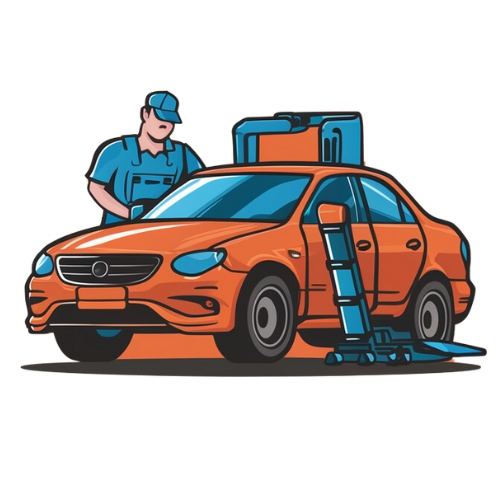
Repairing vs. Writing Off: Making the Right Choice
When deciding whether to repair or write off your car, consider the extent of the damage, repair costs, and the car’s market value. If the damage is minor and repair costs are reasonable, it might be more cost-effective to repair, especially if the car is relatively new or has sentimental value. A thorough assessment from a trusted mechanic is essential to ensure repairs will restore the car to a safe condition. On the other hand, if repair costs approach or exceed the car’s value, writing it off might be the better option to avoid future issues and maintain resale value.

Selling a Damaged Car
Selling a damaged car is another viable alternative to writing it off. This can be appealing if repair costs are too high or you prefer not to deal with repairs. Options include private sales, auctions, and specialised dealerships that buy damaged vehicles. When selling, be transparent about the car’s condition and provide all relevant information. Auctions can offer quick sales, while specialised dealerships handle paperwork and may offer competitive prices. Selling your damaged car can provide funds for a replacement vehicle and help you avoid the financial hit of a write-off.
Read More: For those considering a car purchase, understanding what’s a good interest rate for cars can help you make a more informed decision and possibly save money.

How to Handle a Written-off Car
Dealing with a written-off car involves making decisions about its disposal or potential resale of parts. Proper handling ensures compliance with legal requirements and can help mitigate financial loss. Here are some options for disposing of or selling parts from your written-off vehicle:
Disposal and Recycling Options
When your car is written off, proper disposal and recycling are crucial for environmental and legal reasons. The first step is to deregister the vehicle with the local registration authority. After deregistration, you can choose a disposal method. Many insurance companies offer disposal services as part of the settlement process, handling the removal and scrapping of the vehicle. Alternatively, you can contact licensed scrapyards or recycling facilities that specialise in dismantling vehicles. These facilities will ensure that hazardous materials, such as oils and batteries, are safely removed and recycled. Additionally, many parts of the vehicle, including metals, plastics, and glass, can be recycled, reducing environmental impact and contributing to resource conservation.
Selling Parts from a Written-off Car
If your written-off car still has functional parts, selling these components can be a profitable alternative to complete disposal. Many car owners choose to sell valuable parts like engines, transmissions, tyres, and electronic systems. You can sell parts through online marketplaces, specialised auto part dealers, or local repair shops. This process involves dismantling the car and ensuring each part is in good working condition. Properly cleaned and tested parts can fetch higher prices and attract more buyers. By selling parts, you not only recoup some of the financial loss from the write-off but also contribute to the circular economy by providing affordable parts to other car owners and repair shops.
Conclusion
Dealing with a car write-off in South Africa can be a daunting task, involving several complexities. Whether caused by an accident, theft, or a natural disaster, the decision to write off your car often depends on whether the repair costs exceed the vehicle’s market value. As a car owner, you’ll need to navigate insurance assessments, legal requirements, and potential loan repayments. Exploring options like gap insurance or selling parts from your written-off vehicle can help alleviate financial pressure. By understanding these key aspects, you can make informed decisions that minimise stress and financial strain during such challenging times.
Frequently Asked Questions
When a car is written off, the insurance company deems it beyond economical repair. The insurer will compensate you with the vehicle’s market value before the incident, minus any deductibles or policy limits. You will need to transfer the car’s title to the insurance company, which will then manage the disposal, typically selling it for scrap or parts.
Yes, you can register a repairable write-off in South Africa. However, the car must pass rigorous safety inspections and meet all legal standards before it can be re-registered and driven on public roads. The vehicle must be classified appropriately, usually as a “Code 2,” indicating it can be repaired and returned to service.
A ‘Code 4’ vehicle is classified as beyond repair and must be scrapped. These vehicles cannot be legally driven on public roads again and are typically sold for parts or scrap metal.
Yes, you remain responsible for repaying any outstanding balance on your car loan even if the vehicle is written off. The insurance payout might not cover the entire loan amount, and you may need to cover the difference.
A car write-off can affect your future insurance premiums. Insurers may view you as a higher risk, potentially leading to increased premiums for a new policy. Additionally, your no-claim bonus might be impacted, which could further influence the cost of your future insurance.
Fast, uncomplicated, and trustworthy loan comparisons
At Arcadia Finance, you can compare loan offers from multiple lenders with no obligation and free of charge. Get a clear overview of your options and choose the best deal for you.
Fill out our form today to easily compare interest rates from 19 banks and find the right loan for you.


